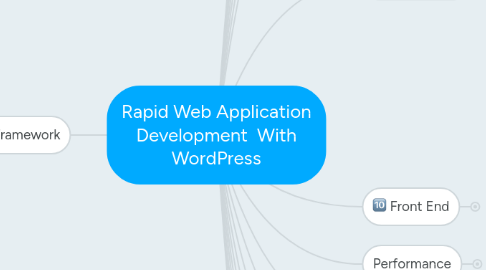
1. Introduction to the Course
1.1. 1 : Welcome!
1.1.1. What To Expect
1.1.2. Goal: Build Apps with Wordpress
1.1.3. We will build an Application
1.2. Overview / Outline:
1.3. What You Will Need For This Course
1.4. Who is this course for. SaaS Entreprenours or Application Developers or UI/UX
1.4.1. SaaS Entreprenuers
1.4.2. Internal Application Developers
1.4.3. UX/UI Prototypes
1.5. Bonus Section: Some Quick Efficiency and Organizational Hacks
1.5.1. Setting Up Chrome
1.5.2. Setting Up a business correctly from the start.
1.5.2.1. Work Your Way through "Get Backed"
1.6. Conventions: No Coding but....
1.7. Other Courses
1.7.1. Another Course: UX Crash Course. How To Plan an appliction
1.7.2. SaaS Marketing
1.7.2.1. PreLaunch Activites
1.7.3. Secret Weapon Plugin Deep Dives
1.7.3.1. Gravity Forms
1.7.3.2. WPMUDEV
1.7.3.2.1. Hummingbird
1.7.3.3. WPTYPES
1.7.3.4. SEO
1.7.3.5. Adminimize
1.7.3.6. Ubermenu
1.7.3.7. Developer Tools
1.7.3.7.1. WPIDE
1.7.3.8. Pagebuilders
1.7.3.8.1. WPBakery Visual Composer
1.7.3.9. WooCommerce
1.7.3.10. Social media
2. WordPress as an Application Framework
2.1. Vocabulary
2.1.1. What is an Application?
2.1.2. What is SaaS?
2.1.3. What are Application Frameworks?
2.1.3.1. Full Stack
2.1.3.1.1. Zend
2.1.3.1.2. CodeIgniter
2.1.3.1.3. CakePHP
2.1.4. What is an API?
2.2. Recent Changes that have made wordpress even more powerful
2.2.1. JSON REST API
2.2.1.1. Authentication
2.3. Limitations of using WordPress as an Application Framework
2.3.1. MVC versus Event-driven Architecture
2.3.1.1. WP MVC
2.3.2. Database Migration
2.3.3. Complex Performance Optimization
2.3.4. Lots of Updates
2.3.5. Mix of procedural and OO codebase
2.4. Built in features that simplify application development
2.4.1. User Management
2.4.2. Admin Dashboard
2.4.2.1. Great Application UI Out of the box
2.4.3. Easy CRUD
2.4.4. API
2.4.4.1. Rest API
2.4.4.2. XMR-RPC API
2.4.5. MultiTenant (WordPress Multiuser)
2.4.6. Easy Dummy Content
2.4.7. Media Management
2.4.8. Plugin Architecture
2.4.9. Template Management
2.4.9.1. The Power of Child Themes
2.4.10. Database Management
2.4.11. Routing
2.4.12. Visit Based CRON JOB
2.4.12.1. Site Status Check Code
2.4.13. Hooks
2.4.13.1. Actions
2.4.13.2. Filters
2.4.14. Widgets
2.4.15. Testing
2.4.15.1. Debug Bar
2.4.15.2. Rewrite Rules
3. Dev Environment
3.1. Local Dev Environment
3.1.1. Local by Flywheel
3.1.2. Github
3.1.3. VSCode
3.1.4. WPEngine SaaSPress Environment
3.2. WordPress Initial Setup
3.2.1. Stopping Comment Spam
3.2.2. Mail deliverability
4. The SaasPress Stack
4.1. SaaS Growth and Support Sites
4.1.1. WordPress Multi-User
4.2. Plugins
4.2.1. Free Plugins
4.2.1.1. Gravity Forms
4.2.1.1.1. Zapier Add-On
4.2.1.1.2. Form Enhancements
4.2.1.1.3. Payment/Invoices Integrations
4.2.1.1.4. Email Integrations
4.2.1.1.5. Support / Instant Messaging
4.2.1.1.6. CRM Integrations
4.2.1.1.7. Project Management
4.2.1.1.8. Document management
4.2.1.1.9. Plugin Repository Items
4.2.1.2. WP-Types
4.2.1.3. WPMUDEV
4.2.1.4. Advanced Custom Fields.
4.2.1.5. Adminimize
4.2.2. Premium Plugins
4.3. Themes
4.3.1. Free Themes
4.3.1.1. Genesis
4.3.1.2. Elegant Themes
4.3.1.2.1. DIVI
4.3.1.3. Frontity Framework
4.3.2. Premium Themes
5. Prototyping
6. User management
6.1. Vocabulary
6.1.1. Capabilites
6.1.2. Roles
6.1.3. Access Control
6.1.4. Routing
6.2. Managing user roles and capabilties
6.2.1. removing existing user roles
6.2.2. Adding Capabilties
6.3. User Registration
6.3.1. Implementing frontend registration
6.4. Login
6.4.1. Google Login
6.4.1.1. Google Apps Login
6.4.2. Social Logins
6.4.3. Custom Login UX/UI
6.5. User Testing Tools
6.5.1. Creating Users
6.5.2. Fast User Switching
6.6. Customizing UX for different Users
6.6.1. White Labeling
6.6.2. Admin Bar
6.6.3. Adminimize
6.7. Profile Customization
6.8. Integrating with LDAP
6.9. Forgot Password
7. Payments and Subscriptions
8. Admin View
8.1. Vocabulary
8.1.1. Backend
8.1.2. Admin Bar
8.1.3. Dashboard
8.2. Customizing Views
8.2.1. Adminimize
8.3. Customizing Menus
8.4. Options
8.4.1. Options API
8.4.2. Admin Options Pages
8.5. White Label
8.5.1. WPMUDEV Ultimate Branding
8.6. Help Systems
8.6.1. WPMUDEV Support Sytem
8.7. Extending Builtin Table Views
8.7.1. Admin Columns
8.8. Admin Themes
9. Easy CRUD
9.1. Vocabulary
9.1.1. What is CRUD?
9.2. Custom Post Types
9.2.1. Overview
9.2.2. Plugins
9.2.2.1. wp-types
9.2.2.2. PODS
9.2.2.3. Custom Post Type UI
9.2.3. Custom Post Type Relationships
9.2.3.1. Posts 2 Posts
9.3. Front end Data Entry
9.3.1. Gravity Forms
9.4. Backend Data Entry
9.5. Media Management
9.5.1. mime types
9.6. Document Management
9.6.1. Google Drive
9.6.1.1. Google Drive Embedder
9.6.2. Dropbox
10. Front End
10.1. Template Execution Hiearchy
10.2. Page Builders
10.3. Application Support Interfaces
10.3.1. The Built In WordPress Help System
10.3.2. Forums
10.3.3. Learning Management Systems
10.3.4. Support Ticketing
10.3.5. Chat Systems
10.3.6. Community Platforms
10.3.7. Onboarding Tools
10.3.7.1. guided tours
10.3.7.1.1. WP Tour
10.3.7.1.2. Website Tour builder
10.3.7.1.3. jQuery Website Tour for WordPress
10.3.7.2. Video Help
10.3.7.3. Email Drip
10.3.8. Demo Builders
10.4. Application Friendly Templates
11. Performance
11.1. image optimization
11.2. Caching
11.2.1. built in non persistant caching
11.2.2. caching plugins
11.2.3. WPEngine caching
11.3. Transients
12. Automation
13. Analytics
13.1. Baremetrics
13.2. EDD Metrics?
14. Security
14.1. Common Types of WordPress Attacks
15. Internationalization
16. For Developers
16.1. Core Extensabilty
16.1.1. Pluggable Functions
16.2. Developer Frameworks
16.2.1. PKLIST
16.3. headless WordPress
16.4. Testing
16.4.1. PHPUnit testing
17. Connecting to Other Websites
18. Social Media
19. SaaS Growth and Management Tools
19.1. Community Building
19.2. SaaS Status Page
19.3. Self support Tools
19.4. Support Tools
19.5. Knowledge bases
19.6. Onboarding Tools
19.6.1. LMS
19.7. Automated Marketing Tools
20. Resources
20.1. But Seriously, WordPress as an Application Platform?
20.2. WordPress For Application Development
20.3. My Thoughts on Building Web Applications with WordPress
20.4. My Thoughts on Building Web Applications with WordPress
20.5. Build an App With WordPress – The compulsory todo list
20.6. Articles
20.6.1. Best WordPress Plugins: 40 Experts Share Their Favorite WordPress Plugins
